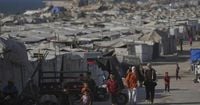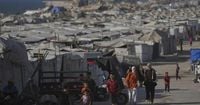Israel has recently refused to renew visas for the heads of at least three key United Nations agencies operating in Gaza, a move that has intensified tensions between the Israeli government and the U.N. humanitarian community. The affected agencies include the Office for the Coordination of Humanitarian Affairs (OCHA), the Office of the High Commissioner for Human Rights (OHCHR), and the United Nations Relief and Works Agency for Palestine Refugees in the Near East (UNRWA). This development comes amid the ongoing conflict in Gaza, where humanitarian conditions have deteriorated sharply.
Tom Fletcher, the U.N. Under-Secretary-General for Humanitarian Affairs and Emergency Relief Coordinator, addressed the U.N. Security Council on July 16, 2025, highlighting the gravity of the situation. Fletcher emphasized that the U.N.’s humanitarian mandate extends beyond merely delivering aid; it also involves advocating for adherence to international humanitarian law. "Each time we report on what we see, we face threats of further reduced access to the civilians we are trying to serve," he said. "Nowhere today is the tension between our advocacy mandate and delivering aid greater than in Gaza." He further stated that Israel explicitly refuses to renew or reduces the duration of visas in response to the U.N.’s efforts to protect civilians.
According to U.N. spokesman Stephane Dujarric, visas for the local leaders of OCHA, OHCHR, and UNRWA have not been renewed in recent months. The individuals affected include Jonathan Whittall, a South African humanitarian expert for OCHA; Ajith Sunghay, a British-educated international lawyer for OHCHR; and Philippe Lazzarini, the Swiss-Italian commissioner general of UNRWA, who has also been barred from entering Gaza.
Israel’s refusal to renew these visas is deeply intertwined with its longstanding criticism of UNRWA. Even before the October 7, 2023, Hamas attack in southern Israel, Israel accused UNRWA of colluding with Hamas and promoting anti-Israel sentiments — allegations that UNRWA vehemently denies. Since the attack, Israeli Prime Minister Benjamin Netanyahu and his far-right allies have accused UNRWA of being infiltrated by Hamas, with some staffers allegedly participating in the attacks. Consequently, Israel formally banned UNRWA from operating in its territory.
At the Security Council meeting, Fletcher painted a bleak picture of life in Gaza. He described conditions as "beyond vocabulary," with food supplies running dangerously low and Palestinians reportedly being shot while seeking food. He accused Israel, as the occupying power, of failing in its obligations under the Geneva Conventions to provide for the civilian population’s basic needs.
Israel, however, pushed back strongly against these accusations. Reut Shapir Ben-Naftaly, political coordinator at Israel’s U.N. Mission, reminded Council members of the devastating October 7 attacks, which killed approximately 1,200 people and left about 250 hostages. She criticized what she called a skewed narrative that casts Israel as the defendant while leaving Hamas, the instigator of the conflict and suffering, unchallenged and immune to condemnation. Israel also accused OCHA of abandoning neutrality and impartiality in its statements and actions.
The humanitarian toll in Gaza is staggering. According to the Hamas-run Gaza Health Ministry, over 58,000 Palestinians have died in the war, with more than half of the casualties being women and children. The ministry does not distinguish between civilians and combatants, but the high proportion of women and minors among the dead underscores the civilian impact of the conflict.
Further compounding the crisis, Ravina Shamdasani, chief spokesperson for the Geneva-based U.N. human rights body, confirmed on July 17, 2025, that the head of its office in the occupied Palestinian territories has been denied entry into Gaza since February 2025. She noted that this denial of access is not unusual, with aid workers, U.N. staff, journalists, and others frequently barred from entering Gaza.
Israel has also accused a U.N.-backed commission investigating abuses in Gaza, as well as Francesca Albanese, the Human Rights Council’s independent investigator, of antisemitism. Albanese, an Italian national, has accused Israel of "genocide" in Gaza, a charge vehemently denied by both Israel and its ally, the United States. The Trump administration recently imposed sanctions against Albanese, highlighting the political sensitivities surrounding these investigations.
Fletcher further revealed that Israel is not granting "security clearances" for U.N. staff to enter Gaza, with humanitarian partners facing increasing denial of access. Alarmingly, 56 percent of entry denials in 2025 were directed at emergency medical teams — frontline responders who save lives amid the chaos. Hundreds of aid workers have been killed in the conflict, and those who remain continue to face hunger, danger, and loss alongside the civilian population.
This visa denial saga underscores the complex and fraught relationship between Israel and the United Nations amid one of the most devastating conflicts in recent history. It raises pressing questions about the ability of humanitarian agencies to operate effectively in Gaza and the broader challenges of protecting civilians in wartime.



